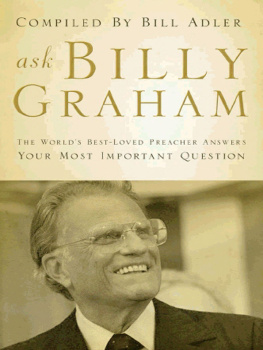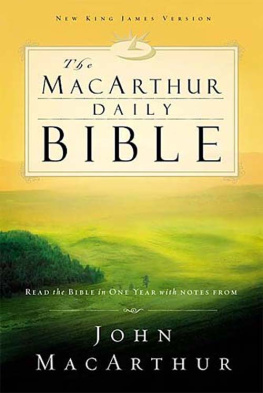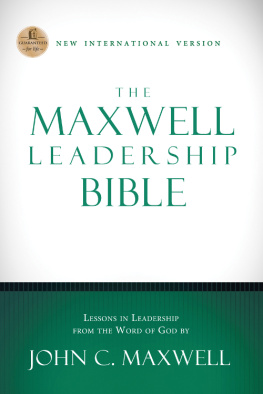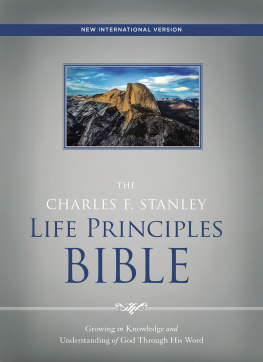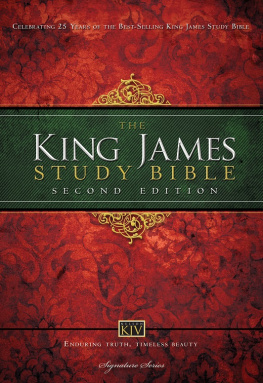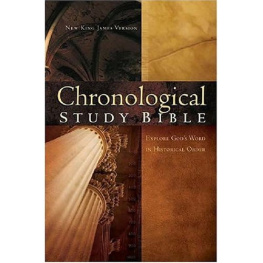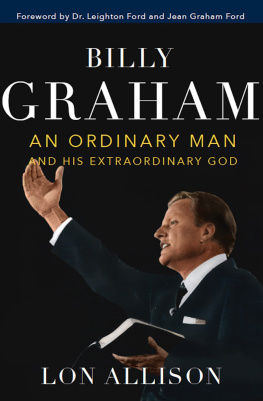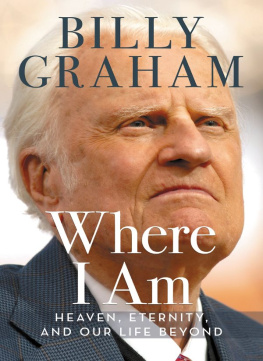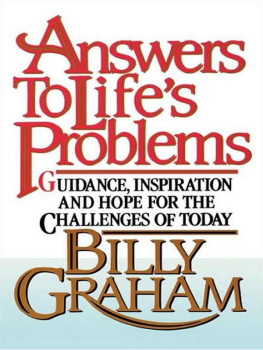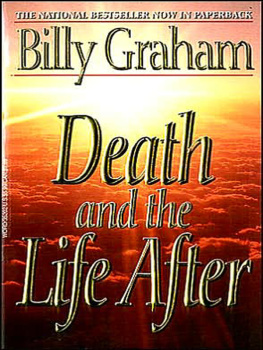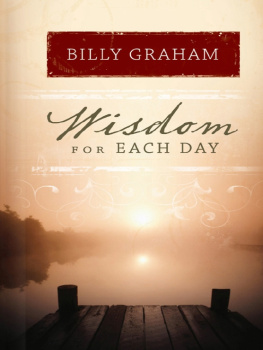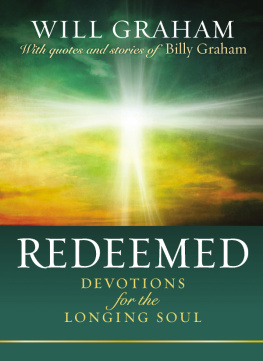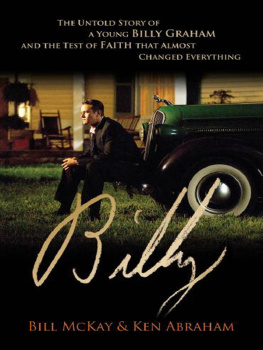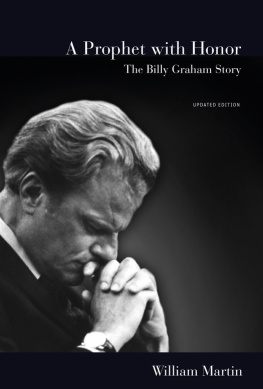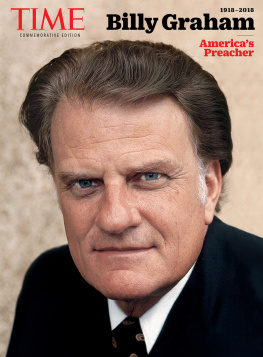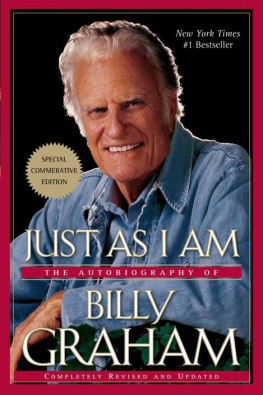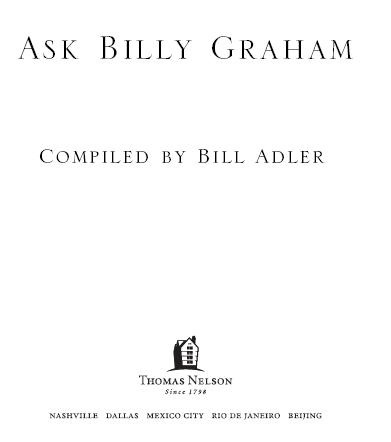
ASK BILLY GRAHAM
2007 by Bill Adler
All rights reserved. No portion of this book may be reproduced, stored in a retrieval system, or transmitted in any form or by any meanselectronic, mechanical, photocopy, recording, scanning, or otherexcept for brief quotations in critical reviews or articles, without the prior written permission of the publisher.
Published in Nashville, Tennessee, by Thomas Nelson. Thomas Nelson is a trademark of Thomas Nelson, Inc.
Thomas Nelson, Inc. books may be purchased in bulk for educational, business, fund-raising, or sales promotional use. For information, please e-mail SpecialMarkets@ThomasNelson.com.
Library of Congress Cataloging-in-Publication Data
Walker, Jay, 1973
Ask Billy Graham / by Bill Adler.
p. cm.
Includes bibliographical references and index.
ISBN: 978-0-8499-0310-6 (hardcover)
ISBN: 978-0-8499-1982-4 (IE)
1. Graham, Billy, 1918Interviews. 2. EvangelistsUnited StatesInterviews.
3. Christianity20th century. 4. Theology. 5.World politics20th century. 6. Moral conditions. I. Title.
BV3785.G69W34 2007
269.2092dc22
2007015908
Printed in the United States of America
07 08 09 10 11 QW 6 5 4 3 2 1
CONTENTS
WOULD YOU LIKE TO KNOW WHAT BILLY GRAHAM THINKS about his life, his work, and his family? What about politics, presidents, terrorism?
This book contains answers to questions many of us would ask Billy Graham if we had the good fortune to sit down with the person who many call Americas pastor. Taken from his sermons, speeches, interviews, television appearances, and writings, Grahams personal thoughts on family, politics, evangelism, and his relationship with U.S. presidents are captured in an easy-to-follow, question-and-answer format. In Ask Billy Graham, this world-famous preacher tackles tough issues such as matters of faith, marriage, drug use, and our relationship with God. Some of his responses are to direct inquiries from reporters, interviewers, and his audience. Others are in reply to rhetorical questions Graham posed to himself in sermons. Still others are answers to age-old questions such as What will heaven be like? or Why does God send natural disasters? In this book, Graham covers it all.
Also included are special sections such as A List of Crusades and Missions and A Partial List of Awards and Honors.Why a partial list of awards? Graham has received so many accolades in his life that nobody is certain that the list is complete!
But before reading his inspiring words and learning from his accumulated wisdom, take a minute to discover a little about the man we know as Billy Graham:
Billy Graham was born William Franklin Graham Jr. on November 7, 1918, near Charlotte, North Carolina, to dairy farmers William Franklin and Morrow Coffey Graham, who attended the Associate Reformed Presbyterian Church. Billy was the first of four children, followed by Catherine, Melvin, and Jean.
Graham grew up during the time of tent revival meetings and traveling evangelists. One of those who toured the South was evangelist Mordecai Ham, who came to Charlotte in 1934. One night, mainly out of curiosity, Graham attended one of Hams meetings and was so moved by the sermon that he committed himself to Christ. He knew then that he wanted to live a Christian life and help others do the same.
Graham enrolled at Bob Jones College, a fundamentalist school in Cleveland, Tennessee. He soon dropped out, however, and transferred to Florida Bible Institute (now Trinity College) in January 1937. He graduated with a bachelor of theology in 1940 and then attended Wheaton College in Wheaton, Illinois. He graduated in 1943 with a bachelor of arts in anthropology. It was at Wheaton that he met his future wife, Ruth Bell, the daughter of missionaries who had been stationed in China. (Indeed, Ruth spent much of her own youth in the Far East.) The two were married after graduation.
Soon Graham began preaching on street corners and in rescue missions to anyone who would listen. Friends at the time reported that he would even preach in front of saloons, often at his own physical peril. He was undeterred. Graham was baptized in accordance with the Southern Baptist Convention, and the following year he was ordained as a Southern Baptist minister in the St. Johns River Association.
Grahams career got a jump start when he became vice president of Youth for Christ, a group that evolved from spirited rallies held all over the country and aimed at young people. Graham traveled throughout North America and Europe, speaking at rallies and organizing chapaskters. Eventually, though, Graham began to organize his own evangelistic rallies, and in 1948 he resigned from Youth for Christ.
Grahams rallies featured solo vocalist George Beverly Shea, choir director and master of ceremonies Cliff Barrows, and associate evangelist Grady Wilson. These people became his lifelong friends and associates. Because of his robust rallies and energetic sermons, Grahams name soon became well known within the evangelistic community, making him a sought-after preacher.
In 1949, Graham received his big break. While leading a campaign in Los Angeles, Graham attracted the attention of newspaper publisher William Randolph Hearst, who ordered his reporters to puff Graham, meaning that they were to write highly positive (some would say fawning) pieces about the preacher. Grahams L.A. campaign, originally scheduled for three weeks, lasted seven weeks, during which time he was in the national spotlight. His story appeared not only in the local papers but in Hearsts nationwide chain of newspapers. Awareness continued to grow as publisher Henry Luce printed articles about Graham in his large-circulation magazines, Time and Life.
Grahams momentum continued. He followed up his success in Los Angeles with rallies in Africa, Asia, South America, and Europe, including blockbuster rallies in London in 1954 and New York in 1957. He was fast becoming an American institution and an international phenomenon.
In 1950 he established the Billy Graham Evangelistic Association (BGEA) in Minneapolis and began preaching on the air, on his weekly radio show Hour of Decision. Soon he also began spreading the gospel on film through his company World Wide Pictures, which produced movies with Christian themes. Graham was a brilliant manager, running his organization much like a business. He avoided the scandals that plagued many other evangelists by refusing to keep donations for himself. Instead he was paid a reasonable salary from BGEA and made sure that his personal life was above reproach. (For example, Graham made the decision never to be alone with a woman who was not his wifenot even dinner in a public restaurantno matter what the circumstance.)
By the late 1950s and early 60s, Graham was holding three to five crusades annually, and his popularity soared. He was also on television with a TV version of his Hour of Decision radio program. Graham then became a prolific writer and author, producing hundreds of magazine articles and scores of books, including several bestsellers such as his autobiography Just as I Am. Later, BGEA published Decision magazine. (See The Billy Graham Evangelistic Association Fact Sheet on page 132 for a listing of the groups projects and programs.)
One of Grahams greatest achievements was spreading the gospel through state-of-the-art technology. He astounded the world when his March 1995 Global Mission in Puerto Rico reached an estimated one billion people in 185 countries via television, videotape, and satellite. It was a landmark event and propelled Graham farther than any modern preacher had gone.
Next page
